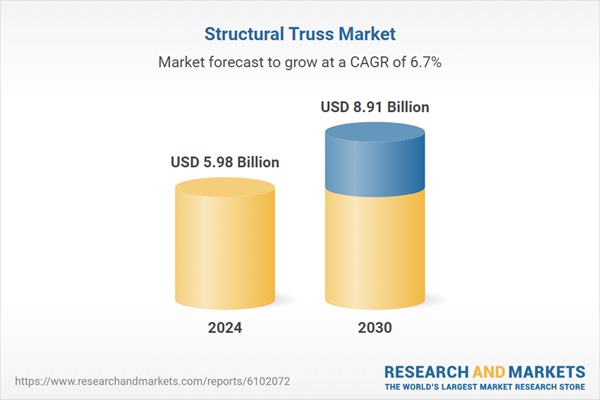Speak directly to the analyst to clarify any post sales queries you may have.
10% Free customizationThis report comes with 10% free customization, enabling you to add data that meets your specific business needs.
Key Market Drivers
Growing Demand for Sustainable and Prefabricated Construction Solutions
The structural truss market is witnessing substantial growth fueled by the rising preference for sustainable and prefabricated construction approaches. Trusses made from wood and light-gauge steel are central to modular building systems, offering high structural strength with reduced material waste. These components are pre-manufactured in controlled factory settings, ensuring precision, reducing on-site labor requirements, and supporting faster construction timelines - all aligning with the global drive toward eco-conscious development. Sustainable forestry practices and the use of certified lumber have further boosted the appeal of timber trusses, especially in LEED-aligned projects. Moreover, favorable regulatory frameworks promoting energy-efficient and environmentally responsible construction continue to accelerate demand for prefabricated truss systems.Key Market Challenges
Fluctuations in Raw Material Prices
A key challenge in the structural truss market lies in the instability of raw material costs, particularly for steel and timber. These materials are heavily influenced by global supply chain dynamics, including geopolitical events, trade regulations, and market demand volatility. Sudden price increases can disrupt procurement plans and compress profit margins, especially in projects with fixed budgets. This unpredictability complicates pricing strategies and poses risks to manufacturers and contractors alike. Moreover, material shortages or export restrictions can hinder timely production and delivery, impacting project schedules and increasing operational risk for stakeholders involved in large-scale or long-duration construction projects.Key Market Trends
Increasing Adoption of Prefabricated and Modular Construction Techniques
The adoption of prefabricated and modular construction methods is a defining trend shaping the structural truss market. Off-site truss manufacturing ensures higher quality control, reduced waste, and faster project delivery compared to traditional on-site assembly. Trusses designed for modular systems help reduce framing time and streamline project execution, particularly in time-sensitive sectors such as residential housing, commercial developments, and infrastructure expansion. Enhanced coordination enabled by Building Information Modeling (BIM) further supports this trend by allowing accurate design and clash detection, ultimately improving efficiency. As the construction sector seeks greater scalability and sustainability, prefabricated truss systems continue to gain traction globally.Key Market Players
- UFP Industries, Inc.
- Simpson Manufacturing Co., Inc.
- Severfield plc
- Goodwin plc
- Vallourec S.A.
- Weyerhaeuser Company
- Nucor Corporation
- Gerdau S.A.
- ITW Inc.
- MiTek Industries, Inc.
Report Scope:
In this report, the Global Structural Truss Market has been segmented into the following categories, in addition to the industry trends which have also been detailed below:Structural Truss Market, By Type:
- Simple Truss
- Complex Truss
Structural Truss Market, By Material:
- Steel
- Aluminum
Structural Truss Market, By Application:
- Residential Construction
- Commercial Construction
Structural Truss Market, By Load Type:
- Dead Load
- Live Load
Structural Truss Market, By Region:
- North America
- United States
- Canada
- Mexico
- Europe
- France
- United Kingdom
- Italy
- Germany
- Spain
- Asia-Pacific
- China
- India
- Japan
- Australia
- South Korea
- South America
- Brazil
- Argentina
- Colombia
- Middle East & Africa
- South Africa
- Saudi Arabia
- UAE
- Kuwait
- Turkey
Competitive Landscape
Company Profiles: Detailed analysis of the major companies present in the Global Structural Truss Market.Available Customizations:
With the given market data, the publisher offers customizations according to a company's specific needs. The following customization options are available for the report.Company Information
- Detailed analysis and profiling of additional market players (up to five).
This product will be delivered within 1-3 business days.
Table of Contents
Companies Mentioned
- UFP Industries, Inc.
- Simpson Manufacturing Co., Inc.
- Severfield plc
- Goodwin plc
- Vallourec S.A.
- Weyerhaeuser Company
- Nucor Corporation
- Gerdau S.A.
- ITW Inc.
- MiTek Industries, Inc.
Table Information
| Report Attribute | Details |
|---|---|
| No. of Pages | 180 |
| Published | June 2025 |
| Forecast Period | 2024 - 2030 |
| Estimated Market Value ( USD | $ 5.98 Billion |
| Forecasted Market Value ( USD | $ 8.91 Billion |
| Compound Annual Growth Rate | 6.7% |
| Regions Covered | Global |
| No. of Companies Mentioned | 10 |









